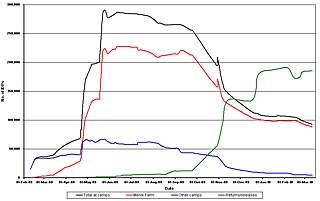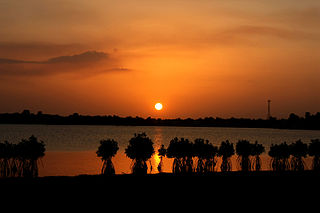
The Office of the United Nations High Commissioner for Refugees is a United Nations programme with the mandate to protect refugees, forcibly displaced communities and stateless people, and assist in their voluntary repatriation, local integration or resettlement to a third country.

An internally displaced person (IDP) is someone who is forced to flee his or her home but who remains within his or her country's borders. They are often referred to as refugees, although they do not fall within the legal definitions of a refugee.
The United Nations Office for the Coordination of Humanitarian Affairs (OCHA) is a United Nations (UN) body formed in December 1991 by General Assembly Resolution 46/182. The resolution was designed to strengthen the UN's response to complex emergencies and natural disasters. Earlier UN organizations with similar tasks were the Department of Humanitarian Affairs (DHA), and its predecessor, the Office of the United Nations Disaster Relief Coordinator (UNDRO). In 1998, due to reorganization, DHA merged into OCHA and was designed to be the UN focal point on major disasters. It is a sitting observer of the political debate United Nations Development Group.
There are multiple humanitarian, medical, economic, and industrial effects of the 2008–2009 Gaza War which started with the Israeli air strikes on 27 December 2008 and ended on 18 January with a cease-fire implemented unilaterally by Israel, and later the same day by Hamas and other Palestinian factions. The cease-fire followed twenty-two days of bombardment by land, sea and air which left over 1,300 Palestinians dead and over 5,000 injured, and the death of 13 Israelis. The United Nations Development Programme warned that there will be long-term consequences of the attacks on Gaza because the livelihoods and assets of tens of thousands of Gaza civilians have been affected.
The Coastal Municipalities Water Utility is the organization responsible for water and sanitation services in the Palestinian Gaza Strip. Its services were severely damaged in the 2008–2009 Israel–Gaza conflict.

The final stages of the Sri Lankan Civil War created 300,000 internally displaced persons (IDPs) who were transferred to camps in Vavuniya District and detained there against their will. This process, together with conditions inside the camps and the slow progress of resettlement attracted much concern and criticism from inside and outside Sri Lanka. On 7 May 2009 the Sri Lankan government announced plans to resettle 80% of the IDPs by the end of 2009. After the end of the civil war Sri Lankan President Mahinda Rajapaksa gave assurances to foreign diplomats that the bulk of the IDPs would be resettled in accordance with the 180-day plan. On 1 December 2009, the IDPs were given limited freedom of movement. The pace of resettlement increased in 2010. The resettlement process was completed and camps were officially closed on 25 September 2012. However, the final batch of IDPs consisting of 110 families were relocated in Kepapilavu in Mullaitivu District-away from their original homes.
Numbers of Sri Lankan internally displaced persons displaced from the Vanni region since October 2008 and detained by the Sri Lankan Military at various camps in northern and eastern Sri Lanka during May 2009:
Numbers of Sri Lankan internally displaced persons displaced from the Vanni region since October 2008 and detained by the Sri Lankan Military at various camps in northern and eastern Sri Lanka during February and March 2009:
Numbers of Sri Lankan internally displaced persons displaced from the Vanni region since October 2008 and detained by the Sri Lankan Military at various camps in northern and eastern Sri Lanka during April 2009:
Numbers of Sri Lankan internally displaced persons displaced from the Vanni region since October 2008 and detained by the Sri Lankan Military at various camps in northern and eastern Sri Lanka during June and July 2009:
Numbers of Sri Lankan internally displaced persons displaced from the Vanni region since October 2008 and detained by the Sri Lankan Military at various camps in northern and eastern Sri Lanka during August and September 2009:
Colonel Ahmed Usman was a Nigerian Military Administrator of Ondo State and then of Oyo State during the military regime of General Sani Abacha.
Numbers of Sri Lankan internally displaced persons displaced from the Vanni region since October 2008 and detained by the Sri Lankan Military at various camps in northern Sri Lanka during February 2010 to December 2010:
There are allegations that war crimes were committed by the Sri Lankan military and the rebel Liberation Tigers of Tamil Eelam during the Sri Lankan Civil War, particularly during the final months of the Eelam War IV phase in 2009. The alleged war crimes include attacks on civilians and civilian buildings by both sides; executions of combatants and prisoners by both sides; enforced disappearances by the Sri Lankan military and paramilitary groups backed by them; acute shortages of food, medicine, and clean water for civilians trapped in the war zone; and child recruitment by the Tamil Tigers. A panel of experts appointed by United Nations Secretary-General (UNSG) Ban Ki-moon to advise him on the issue of accountability with regard to any alleged violations of international human rights and humanitarian law during the final stages of the civil war found "credible allegations" which, if proven, indicated that war crimes and crimes against humanity were committed by the Sri Lankan military and the Tamil Tigers. The panel has called on the UNSG to conduct an independent international inquiry into the alleged violations of international law. The Sri Lankan government has denied that its forces committed any war crimes and has strongly opposed any international investigation. In March 2014 the United Nations Human Rights Council authorised an international investigation into the alleged war crimes.
Sudanese refugees are persons originating from the country of Sudan, but seeking refuge outside the borders of their native country. In recent history, Sudan has been the stage for prolonged conflicts and civil wars, as well as environmental changes, namely desertification. These forces have resulted not only in violence and famine, but also the forced migration of large numbers of the Sudanese population, both inside and outside the country's borders. Given the expansive geographic territory of Sudan, and the regional and ethnic tensions and conflicts, much of the forced migration in Sudan has been internal. Yet, these populations are not immune from similar issues that typically accompany refugeedom, including economic hardship and providing themselves and their families with sustenance and basic needs. With the creation of a South Sudanese state, questions surrounding southern Sudanese IDPs may become questions of South Sudanese refugees.
Refugees of the Libyan Civil War are the people, predominantly Libyans, who fled or were expelled from their homes during the Libyan Civil War, from within the borders of Libya to the neighbouring states of Tunisia, Egypt and Chad, as well as to European countries across the Mediterranean. The majority of Libyan refugees are Arabs and Berbers, though many of the other ethnicities temporarily living in Libya originated from sub-Saharan Africa. These groups were also among the first refugee waves to exit the country. The total number of Libyan refugees were estimated at around one million as of June 2011 and most returned after the civil war ended. As of January 2013, there were 5,252 refugees originating from Libya alongside 59,425 internally displaced persons registered by the UNHCR.
Between July 2011 and mid-2012, a severe drought affected the entire East Africa region. Said to be "the worst in 60 years", the drought caused a severe food crisis across Somalia, Djibouti, Ethiopia and Kenya that threatened the livelihood of 9.5 million people. Many refugees from southern Somalia fled to neighboring Kenya and Ethiopia, where crowded, unsanitary conditions together with severe malnutrition led to a large number of deaths. Other countries in East Africa, including Sudan, South Sudan and parts of Uganda, were also affected by a food crisis.

Lies Agreed Upon is a documentary produced by Sri Lanka Ministry of Defence in response to a documentary aired by Channel 4, named Sri Lanka's Killing Fields, about the final weeks of the Sri Lankan Civil War. The documentary gives the Sri Lanka Ministry of Defence response to war crimes accusations and rebuts points made by the producers of the Channel 4 documentary, who presented it as "a forensic investigation into the final weeks of the quarter-century-long civil war between the government of Sri Lanka and the secessionist rebels, the Tamil Tigers." Lies Agreed Upon was first aired at an official function held at Hilton Hotel, Colombo on 1 August 2011, one and half months after the broadcasting of "Sri Lanka's Killing Fields". Ministry of Defence released another report named Humanitarian Operation – Factual Analysis : July 2006 – May 2009 on the same day.

Humanitarian aid during the Syrian Civil War has been provided by various international bodies, organizations and states. The main effort is coordinated by John Ging of the United Nations Office for the Coordination of Humanitarian Affairs (UNOCHA). In 2014, U.N. Security Council Resolution 2165 authorised humanitarian aid to be supplied via four border crossings not controlled by the Syrian government, generally to supply rebel-controlled territory.

Gereida, also spelled Gerida or Graida, is a large town located in south-western Sudan at an altitude of 1586 feet above sea level. It lies about 100 km south of Nyala, and has a population of over one hundred thousand people.







